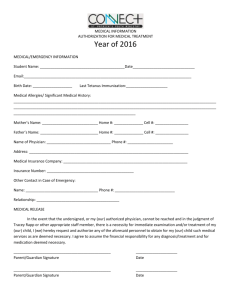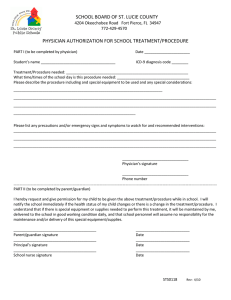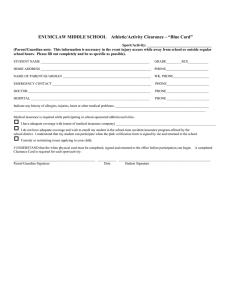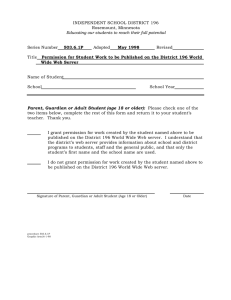PIAA COMPREHENSIVE INITIAL PRE-PARTICIPATION PHYSICAL EVALUATION
advertisement
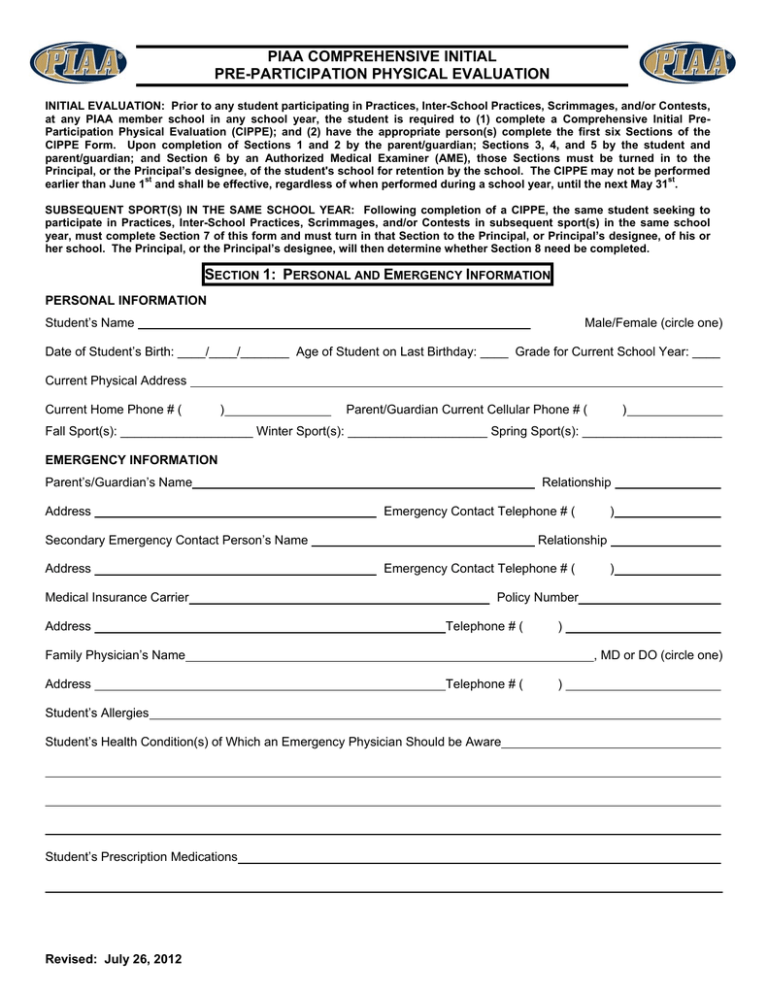
PIAA COMPREHENSIVE INITIAL PRE-PARTICIPATION PHYSICAL EVALUATION INITIAL EVALUATION: Prior to any student participating in Practices, Inter-School Practices, Scrimmages, and/or Contests, at any PIAA member school in any school year, the student is required to (1) complete a Comprehensive Initial PreParticipation Physical Evaluation (CIPPE); and (2) have the appropriate person(s) complete the first six Sections of the CIPPE Form. Upon completion of Sections 1 and 2 by the parent/guardian; Sections 3, 4, and 5 by the student and parent/guardian; and Section 6 by an Authorized Medical Examiner (AME), those Sections must be turned in to the Principal, or the Principal’s designee, of the student's school for retention by the school. The CIPPE may not be performed st st earlier than June 1 and shall be effective, regardless of when performed during a school year, until the next May 31 . SUBSEQUENT SPORT(S) IN THE SAME SCHOOL YEAR: Following completion of a CIPPE, the same student seeking to participate in Practices, Inter-School Practices, Scrimmages, and/or Contests in subsequent sport(s) in the same school year, must complete Section 7 of this form and must turn in that Section to the Principal, or Principal’s designee, of his or her school. The Principal, or the Principal’s designee, will then determine whether Section 8 need be completed. SECTION 1: PERSONAL AND EMERGENCY INFORMATION PERSONAL INFORMATION Student’s Name Male/Female (circle one) Date of Student’s Birth: ____/____/_______ Age of Student on Last Birthday: ____ Grade for Current School Year: ____ Current Physical Address Current Home Phone # ( ) Parent/Guardian Current Cellular Phone # ( ) Fall Sport(s): ___________________ Winter Sport(s): ____________________ Spring Sport(s): ____________________ EMERGENCY INFORMATION Parent’s/Guardian’s Name Address Relationship Emergency Contact Telephone # ( Secondary Emergency Contact Person’s Name Address Medical Insurance Carrier Address Relationship Emergency Contact Telephone # ( Telephone # ( ) , MD or DO (circle one) Telephone # ( Student’s Allergies Student’s Health Condition(s) of Which an Emergency Physician Should be Aware Student’s Prescription Medications Revised: July 26, 2012 ) Policy Number Family Physician’s Name Address ) ) SECTION 2: CERTIFICATION OF PARENT/GUARDIAN The student’s parent/guardian must complete all parts of this form. A. I hereby give my consent for _______________________________________________ born on ________________ who turned ______ on his/her last birthday, a student of ____________________________________________ School and a resident of the ______________________________________________________________ public school district, to participate in Practices, Inter-School Practices, Scrimmages, and/or Contests during the 20____ - 20____ school year in the sport(s) as indicated by my signature(s) following the name of the said sport(s) approved below. Fall Sports Cross Country Field Hockey Football Signature of Parent or Guardian Golf Soccer Girls’ Tennis Girls’ Volleyball Water Polo Other Winter Sports Basketball Bowling Competitive Spirit Squad Girls’ Gymnastics Rifle Swimming and Diving Track & Field (Indoor) Wrestling Other Signature of Parent or Guardian Spring Sports Signature of Parent or Guardian Baseball Boys’ Lacrosse Girls’ Lacrosse Softball Boys’ Tennis Track & Field (Outdoor) Boys’ Volleyball Other B. Understanding of eligibility rules: I hereby acknowledge that I am familiar with the requirements of PIAA concerning the eligibility of students at PIAA member schools to participate in Inter-School Practices, Scrimmages, and/or Contests involving PIAA member schools. Such requirements, which are posted on the PIAA Web site at www.piaa.org, include, but are not necessarily limited to age, amateur status, school attendance, health, transfer from one school to another, season and out-of-season rules and regulations, semesters of attendance, seasons of sports participation, and academic performance. Parent’s/Guardian’s Signature ______________________________________________________Date____/____/_____ C. Disclosure of records needed to determine eligibility: To enable PIAA to determine whether the herein named student is eligible to participate in interscholastic athletics involving PIAA member schools, I hereby consent to the release to PIAA of any and all portions of school record files, beginning with the seventh grade, of the herein named student specifically including, without limiting the generality of the foregoing, birth and age records, name and residence address of parent(s) or guardian(s), residence address of the student, health records, academic work completed, grades received, and attendance data. Parent’s/Guardian’s Signature ______________________________________________________Date____/____/_____ D. Permission to use name, likeness, and athletic information: I consent to PIAA’s use of the herein named student’s name, likeness, and athletically related information in reports of Inter-School Practices, Scrimmages, and/or Contests, promotional literature of the Association, and other materials and releases related to interscholastic athletics. Parent’s/Guardian’s Signature ______________________________________________________Date____/____/_____ E. Permission to administer emergency medical care: I consent for an emergency medical care provider to administer any emergency medical care deemed advisable to the welfare of the herein named student while the student is practicing for or participating in Inter-School Practices, Scrimmages, and/or Contests. Further, this authorization permits, if reasonable efforts to contact me have been unsuccessful, physicians to hospitalize, secure appropriate consultation, to order injections, anesthesia (local, general, or both) or surgery for the herein named student. I hereby agree to pay for physicians’ and/or surgeons’ fees, hospital charges, and related expenses for such emergency medical care. Parent’s/Guardian’s Signature ______________________________________________________Date____/____/_____ Revised: July 26, 2012 SECTION 3: UNDERSTANDING OF RISK OF CONCUSSION AND TRAUMATIC BRAIN INJURY What is a concussion? A concussion is a brain injury that: Is caused by a bump, blow, or jolt to the head or body. Can change the way a student’s brain normally works. Can occur during Practices and/or Contests in any sport. Can happen even if a student has not lost consciousness. Can be serious even if a student has just been “dinged” or “had their bell rung.” All concussions are serious. A concussion can affect a student’s ability to do schoolwork and other activities (such as playing video games, working on a computer, studying, driving, or exercising). Most students with a concussion get better, but it is important to give the concussed student’s brain time to heal. What are the symptoms of a concussion? Concussions cannot be seen; however, in a potentially concussed student, one or more of the symptoms listed below may become apparent and/or that the student “doesn’t feel right” soon after, a few days after, or even weeks after the injury. Headache or “pressure” in head Feeling sluggish, hazy, foggy, or groggy Nausea or vomiting Difficulty paying attention Balance problems or dizziness Memory problems Double or blurry vision Confusion Bothered by light or noise What should students do if they believe that they or someone else may have a concussion? Students feeling any of the symptoms set forth above should immediately tell their Coach and their parents. Also, if they notice any teammate evidencing such symptoms, they should immediately tell their Coach. The student should be evaluated. A licensed physician of medicine or osteopathic medicine (MD or DO), sufficiently familiar with current concussion management, should examine the student, determine whether the student has a concussion, and determine when the student is cleared to return to participate in interscholastic athletics. Concussed students should give themselves time to get better. If a student has sustained a concussion, the student’s brain needs time to heal. While a concussed student’s brain is still healing, that student is much more likely to have another concussion. Repeat concussions can increase the time it takes for an already concussed student to recover and may cause more damage to that student’s brain. Such damage can have long term consequences. It is important that a concussed student rest and not return to play until the student receives permission from an MD or DO, sufficiently familiar with current concussion management, that the student is symptom-free. How can students prevent a concussion? Every sport is different, but there are steps students can take to protect themselves. Use the proper sports equipment, including personal protective equipment. For equipment to properly protect a student, it must be: The right equipment for the sport, position, or activity; Worn correctly and the correct size and fit; and Used every time the student Practices and/or competes. Follow the Coach’s rules for safety and the rules of the sport. Practice good sportsmanship at all times. If a student believes they may have a concussion: Don’t hide it. Report it. Take time to recover. I hereby acknowledge that I am familiar with the nature and risk of concussion and traumatic brain injury while participating in interscholastic athletics, including the risks associated with continuing to compete after a concussion or traumatic brain injury. Student’s Signature _________________________________________________________________________Date____/____/_____ I hereby acknowledge that I am familiar with the nature and risk of concussion and traumatic brain injury while participating in interscholastic athletics, including the risks associated with continuing to compete after a concussion or traumatic brain injury. Parent’s/Guardian’s Signature _______________________________________________________________Date____/____/_____ Revised: July 26, 2012 ADDENDUM TO SECTION 3 Below is a comprehensive list of symptoms of a concussion. - Headache - Balance problems - Drowsiness - “Pressure in head” - Sensitivity to light - Trouble falling asleep - Neck Pain - Sensitivity to noise - Trouble staying asleep - Nausea - Feeling slowed down - Sleeping more than usual - Vomiting - Feeling mentally “foggy” - Sleeping less than usual - Dizziness - Difficulty concentrating - Feeling more emotional - Blurred vision - Difficulty remembering - Irritability - Other visual problems - Fatigue - Sadness - Numbness or tingling - Confusion - Nervous or Anxious We have read Section 3 of the PIAA Pre-Participation Physical Evaluation and the Addendum to Section 3. (If true, please check box.) After reading Section 3 and the Addendum to Section 3, I am aware of the following information: Student Athlete Initials Parent/Guardian Initials A concussion is a brain injury, which should be reported to my parents, my coach, or the Athletic Trainer. A concussion can affect the ability to perform everyday activities such as the ability to think, balance and classroom performance. A concussion cannot be "seen." Some symptoms might be present right away. Other symptoms can show up hours or days after injury. I will tell my parents, my coach, and/or the Athletic Trainer about my injuries and illnesses. If I think a teammate has a concussion, I should tell my coach, parents or Athletic Trainer about the concussion. I will not return to play in a game or practice if a hit to my head or body causes any concussion-related symptoms. I will/my child will need written permission from a medical professional trained in concussion management (referral list provided) to return to play or practice after a concussion. Based on the latest data, most concussions take days or weeks to get better. A concussion may not go away right away. I realize that resolution from this injury is a process and may require more than one medical evaluation. I realize that the ER/Urgent Care physicians will not provide clearance if seen right away after the injury. After a concussion, the brain needs time to heal. I understand that I am/my child is much more likely to have another concussion or serious brain injury if return to play or practice occurs before concussion symptoms go away/ Sometimes, repeat concussions can cause serious and long-lasting problems. I have read the concussion symptoms listed above. __________________________________ Signature of Student Athlete _______________ Date __________________________________ Signature of Parent/Guardian _______________ Date N/A N/A N/A SECTION 4: UNDERSTANDING OF SUDDEN CARDIAC ARREST SYMPTOMS AND WARNING SIGNS What is sudden cardiac arrest? Sudden cardiac arrest (SCA) is when the heart stops beating, suddenly and unexpectedly. When this happens blood stops flowing to the brain and other vital organs. SCA is NOT a heart attack. A heart attack may cause SCA, but they are not the same. A heart attack is caused by a blockage that stops the flow of blood to the heart. SCA is a malfunction in the heart’s electrical system, causing the heart to suddenly stop beating. How common is sudden cardiac arrest in the United States? There are about 300,000 cardiac arrests outside hospitals each year. About 2,000 patients under 25 die of SCA each year. Are there warning signs? Although SCA happens unexpectedly, some people may have signs or symptoms, such as: dizziness fatigue (extreme tiredness) lightheadedness weakness shortness of breath nausea difficulty breathing vomiting racing or fluttering heartbeat (palpitations) chest pains syncope (fainting) These symptoms can be unclear and confusing in athletes. Often, people confuse these warning signs with physical exhaustion. SCA can be prevented if the underlying causes can be diagnosed and treated. What are the risks of practicing or playing after experiencing these symptoms? There are risks associated with continuing to practice or play after experiencing these symptoms. When the heart stops, so does the blood that flows to the brain and other vital organs. Death or permanent brain damage can occur in just a few minutes. Most people who have SCA die from it. Act 59 – the Sudden Cardiac Arrest Prevention Act (the Act) The Act is intended to keep student-athletes safe while practicing or playing. The requirements of the Act are: Information about SCA symptoms and warning signs. Every student-athlete and their parent or guardian must read and sign this form. It must be returned to the school before participation in any athletic activity. A new form must be signed and returned each school year. Schools may also hold informational meetings. The meetings can occur before each athletic season. Meetings may include student-athletes, parents, coaches and school officials. Schools may also want to include doctors, nurses, and athletic trainers. Removal from play/return to play Any student-athlete who has signs or symptoms of SCA must be removed from play. The symptoms can happen before, during, or after activity. Play includes all athletic activity. Before returning to play, the athlete must be evaluated. Clearance to return to play must be in writing. The evaluation must be performed by a licensed physician, certified registered nurse practitioner, or cardiologist (heart doctor). The licensed physician or certified registered nurse practitioner may consult any other licensed or certified medical professionals. I have reviewed and understand the symptoms and warning signs of SCA. ______________________________________ Signature of Student-Athlete ___________________________________ Print Student-Athlete’s Name Date____/____/_____ ______________________________________ Signature of Parent/Guardian ___________________________________ Print Parent/Guardian’s Name Date____/____/_____ PA Department of Health: Sudden Cardiac Arrest Symptoms and Warning Signs Information Sheet and Acknowledgement of Receipt and Review Form. 7/2012 Revised: July 26, 2012 Student’s Name Age Grade SECTION 5: HEALTH HISTORY Explain “Yes” answers at the bottom of this form. Circle questions you don’t know the answers to. Yes Neck Shoulder Upper back Lower back Hip Upper arm Thigh 20. 21. Elbow Forearm Knee Calf/shin Have you ever had a stress fracture? Have you been told that you have or have you had an x-ray for atlantoaxial (neck) instability? 22. Do you regularly use a brace or assistive device? #’s No 23. Has a doctor ever denied or restricted your participation in sport(s) for any reason? 2. Do you have an ongoing medical condition (like asthma or diabetes)? 3. Are you currently taking any prescription or nonprescription (over-the-counter) medicines or pills? 4. Do you have allergies to medicines, pollens, foods, or stinging insects? 5. Have you ever passed out or nearly passed out DURING exercise? 6. Have you ever passed out or nearly passed out AFTER exercise? 7. Have you ever had discomfort, pain, or pressure in your chest during exercise? 8. Does your heart race or skip beats during exercise? 9. Has a doctor ever told you that you have (check all that apply): High blood pressure Heart murmur High cholesterol Heart infection 10. Has a doctor ever ordered a test for your heart? (for example ECG, echocardiogram) 11. Has anyone in your family died for no apparent reason? 12. Does anyone in your family have a heart problem? 13. Has any family member or relative been disabled from heart disease or died of heart problems or sudden death before age 50? 14. Does anyone in your family have Marfan syndrome? 15. Have you ever spent the night in a hospital? 16. Have you ever had surgery? 17. Have you ever had an injury, like a sprain, muscle, or ligament tear, or tendonitis, which caused you to miss a Practice or Contest? If yes, circle affected area below: 18. Have you had any broken or fractured bones or dislocated joints? If yes, circle below: 19. Have you had a bone or joint injury that required x-rays, MRI, CT, surgery, injections, rehabilitation, physical therapy, a brace, a cast, or crutches? If yes, circle below: Head Yes No 1. Hand/ Fingers Ankle Chest Foot/ Toes Has a doctor every told you that you have asthma or allergies? 24. Do you cough, wheeze, or have difficulty breathing DURING or AFTER exercise? 25. Is there anyone in your family who has asthma? 26. Have you ever used an inhaler or taken asthma medicine? 27. Were you born without or are your missing a kidney, an eye, a testicle, or any other organ? 28. Have you had infectious mononucleosis (mono) within the last month? 29. Do you have any rashes, pressure sores, or other skin problems? 30. Have you ever had a herpes skin infection? CONCUSSION OR TRAUMATIC BRAIN INJURY 31. Have you ever had a concussion (i.e. bell rung, ding, head rush) or traumatic brain injury? 32. Have you been hit in the head and been confused or lost your memory? 33. Do you experience dizziness and/or headaches with exercise? 34. Have you ever had a seizure? 35. Have you ever had numbness, tingling, or weakness in your arms or legs after being hit or falling? 36. Have you ever been unable to move your arms or legs after being hit or falling? 37. When exercising in the heat, do you have severe muscle cramps or become ill? 38. Has a doctor told you that you or someone in your family has sickle cell trait or sickle cell disease? 39. Have you had any problems with your eyes or vision? 40. Do you wear glasses or contact lenses? 41. Do you wear protective eyewear, such as goggles or a face shield? 42. Are you unhappy with your weight? 43. Are you trying to gain or lose weight? 44. Has anyone recommended you change your weight or eating habits? 45. Do you limit or carefully control what you eat? 46. Do you have any concerns that you would like to discuss with a doctor? FEMALES ONLY 47. Have you ever had a menstrual period? 48. How old were you when you had your first menstrual period? 49. How many periods have you had in the last 12 months? 50. Are you pregnant? Explain “Yes” answers here: I hereby certify that to the best of my knowledge all of the information herein is true and complete. Student’s Signature _________________________________________________________________________Date____/____/_____ I hereby certify that to the best of my knowledge all of the information herein is true and complete. Parent’s/Guardian’s Signature _________________________________________________________________Date____/____/_____ Revised: July 26, 2012 SECTION 6: PIAA COMPREHENSIVE INITIAL PRE-PARTICIPATION PHYSICAL EVALUATION AND CERTIFICATION OF AUTHORIZED MEDICAL EXAMINER Must be completed and signed by the Authorized Medical Examiner (AME) performing the herein named student’s comprehensive initial pre-participation physical evaluation (CIPPE) and turned in to the Principal, or the Principal’s designee, of the student's school. Student’s Name Age Enrolled in _______________________________________ School Grade Sport(s) Height_______ Weight______ % Body Fat (optional) ______ Brachial Artery BP_____/_____ (_____/_____ , _____/_____) RP_______ If either the brachial artery blood pressure (BP) or resting pulse (RP) is above the following levels, further evaluation by the student’s primary care physician is recommended. Age 10-12: BP: >126/82, RP: >104; Age 13-15: BP: >136/86, RP >100; Age 16-25: BP: >142/92, RP >96. Vision: R 20/_____ L 20/_____ Corrected: YES NO (circle one) Pupils: Equal_____ Unequal_____ MEDICAL NORMAL ABNORMAL FINDINGS Appearance Eyes/Ears/Nose/Throat Hearing Lymph Nodes Heart murmur Femoral pulses to exclude aortic coarctation Physical stigmata of Marfan syndrome Cardiovascular Cardiopulmonary Lungs Abdomen Genitourinary (males only) Neurological Skin MUSCULOSKELETAL NORMAL ABNORMAL FINDINGS Neck Back Shoulder/Arm Elbow/Forearm Wrist/Hand/Fingers Hip/Thigh Knee Leg/Ankle Foot/Toes I hereby certify that I have reviewed the HEALTH HISTORY, performed a comprehensive initial pre-participation physical evaluation of the herein named student, and, on the basis of such evaluation and the student’s HEALTH HISTORY, certify that, except as specified below, the student is physically fit to participate in Practices, Inter-School Practices, Scrimmages, and/or Contests in the sport(s) consented to by the student’s parent/guardian in Section 2 of the PIAA Comprehensive Initial Pre-Participation Physical Evaluation form: CLEARED CLEARED, with recommendation(s) for further evaluation or treatment for: NOT CLEARED for the following types of sports (please check those that apply): COLLISION CONTACT NON-CONTACT STRENUOUS MODERATELY STRENUOUS NON-STRENUOUS Due to Recommendation(s)/Referral(s) AME’s Name (print/type) License # Address______________________________________________________________________ Phone ( ) AME’s Signature______________________________________MD, DO, PAC, CRNP, or SNP (circle one) Revised: July 26, 2012 Date of CIPPE ___/____/___ SECTION 7: RE-CERTIFICATION BY PARENT/GUARDIAN This form must be completed not earlier than six weeks prior to the first Practice day of the sport(s) in the sports season(s) identified herein by the parent/guardian of any student who is seeking to participate in Practices, Inter-School Practices, Scrimmages, and/or Contests in all subsequent sport seasons in the same school year. The Principal, or the Principal’s designee, of the herein named student’s school must review the SUPPLEMENTAL HEALTH HISTORY. If any SUPPLEMENTAL HEALTH HISTORY questions are either checked yes or circled, the herein named student shall submit a completed Section 8, Re-Certification by Licensed Physician of Medicine or Osteopathic Medicine, to the Principal, or Principal’s designee, of the student’s school. SUPPLEMENTAL HEALTH HISTORY Student’s Name Male/Female (circle one) Date of Student’s Birth: ______/______/_________ Age of Student on Last Birthday: ______ Grade for Current School Year: ______ Winter Sport(s): ________________________________________ Spring Sport(s): ________________________________________ CHANGES TO PERSONAL INFORMATION (In the spaces below, identify any changes to the Personal Information set forth in the original Section 1: PERSONAL AND EMERGENCY INFORMATION): Current Home Address Current Home Telephone # ( ) Parent/Guardian Current Cellular Phone # ( ) CHANGES TO EMERGENCY INFORMATION (In the spaces below, identify any changes to the Emergency Information set forth in the original Section 1: PERSONAL AND EMERGENCY INFORMATION): Parent’s/Guardian’s Name Relationship Address Emergency Contact Telephone # ( Secondary Emergency Contact Person’s Name ) Relationship Address Emergency Contact Telephone # ( Medical Insurance Carrier ) Policy Number Address Telephone # ( ) Family Physician’s Name , MD or DO (circle one) Address Telephone # ( ) SUPPLEMENTAL HEALTH HISTORY: Explain “Yes” answers at the bottom of this form. Circle questions you don’t know the answers to. Yes 1. 2. 3. Since completion of the CIPPE, have you sustained an illness and/or injury that required medical treatment from a licensed physician of medicine or osteopathic medicine? Since completion of the CIPPE, have you had a concussion (i.e. bell rung, ding, head rush) or traumatic brain injury? Since completion of the CIPPE, have you experienced dizzy spells, blackouts, and/or unconsciousness? #’s No Yes 4. 5. 6. No Since completion of the CIPPE, have you experienced any episodes of unexplained shortness of breath, wheezing, and/or chest pain? Since completion of the CIPPE, are you taking any NEW prescription medicines or pills? Do you have any concerns that you would like to discuss with a physician? Explain “Yes” answers here: I hereby certify that to the best of my knowledge all of the information herein is true and complete. Student’s Signature _________________________________________________________________________Date____/____/_____ I hereby certify that to the best of my knowledge all of the information herein is true and complete. Parent’s/Guardian’s Signature _________________________________________________________________Date____/____/_____ Revised: July 26, 2012 Section 8: Re-CERTIFICATION BY LICENSED PHYSICIAN OF MEDICINE OR OSTEOPATHIC MEDICINE This Form must be completed for any student who, subsequent to completion of Sections 1 through 6 of this CIPPE Form, required medical treatment from a licensed physician of medicine or osteopathic medicine. This Section 8 may be completed at any time following completion of such medical treatment. Upon completion, the Form must be turned in to the Principal, or the Principal’s designee, of the student's school, who, pursuant to ARTICLE X, LOCAL MANAGEMENT AND CONTROL, Section 2, Powers and Duties of Principal, subsection C, of the PIAA Constitution, shall “exclude any contestant who has suffered serious illness or injury until that contestant is pronounced physically fit by the school’s licensed physician of medicine or osteopathic medicine, or if none is employed, by another licensed physician of medicine or osteopathic medicine.” NOTE: The physician completing this Form must first review Sections 5 and 6 of the herein named student's previously completed CIPPE Form. Section 7 must also be reviewed if both (1) this Form is being used by the herein named student to participate in Practices, Inter-School Practices, Scrimmages, and/or Contests in a subsequent sport season in the same school year AND (2) the herein named student either checked yes or circled any Supplemental Health History questions in Section 7. If the physician completing this Form is clearing the herein named student subsequent to that student sustaining a concussion or traumatic brain injury, that physician must be sufficiently familiar with current concussion management such that the physician can certify that all aspects of evaluation, treatment, and risk of that injury have been thoroughly covered by that physician. Student's Name: Age Grade Enrolled in __________________________________________________________________________________School Condition(s) Treated Since Completion of the Herein Named Student’s CIPPE Form: A. GENERAL CLEARANCE: Absent any illness and/or injury, which requires medical treatment, subsequent to the date set forth below, I hereby authorize the above-identified student to participate for the remainder of the current school year in additional interscholastic athletics with no restrictions, except those, if any, set forth in Section 6 of that student’s CIPPE Form. Physician’s Name (print/type)__________________________________________________ License #_______________ Address___________________________________________________________________ Phone ( )____________ Physician’s Signature _____________________________________________MD or DO (circle one) Date____________ B. LIMITED CLEARANCE: Absent any illness and/or injury, which requires medical treatment, subsequent to the date set forth below, I hereby authorize the above-identified student to participate for the remainder of the current school year in additional interscholastic athletics with, in addition to the restrictions, if any, set forth in Section 6 of that student’s CIPPE Form, the following limitations/restrictions: 1. 2. 3. 4. Physician’s Name (print/type)__________________________________________________ License #_______________ Address__________________________________________________________________ Phone ( )____________ Physician’s Signature _____________________________________________MD or DO (circle one) Date____________ Revised: July 26, 2012 Section 9: CIPPE MINIMUM WRESTLING WEIGHT INSTRUCTIONS Pursuant to the Weight Control Program adopted by PIAA, prior to the participation by any student in interscholastic wrestling, the Minimum Wrestling Weight (MWW) at which the student may wrestle during the season must be (1) certified to by an Authorized Medical Examiner (AME) and (2) established NO EARLIER THAN six weeks prior to the first Regular Season Contest day of the wrestling season and NO LATER THAN the Monday preceding the first Regular Season Contest day of the wrestling season (See NOTE 1). This certification shall be provided to and maintained by the student’s Principal, or the Principal’s designee. In certifying to the MWW, the AME shall first make a determination of the student's Urine Specific Gravity/Body Weight and Percentage of Body Fat, or shall be given that information from a person authorized to make such an assessment ("the Assessor"). This determination shall be made consistent with National Federation of State High School Associations (NFHS) Wrestling Rule 1, Competition, Section 3, Weight-Control Program, which requires, in relevant part, hydration testing with a specific gravity not greater than 1.025, and an immediately following body fat assessment, as determined by the National Wrestling Coaches Association (NWCA) Optimal Performance Calculator (OPC) (together, the “Initial Assessment”). Where the Initial Assessment establishes a percentage of body fat below 7% for a male or 12% for a female, the student must obtain an AME’s consent to participate. For all wrestlers, the MWW must be certified to by an AME. Student’s Name Age Grade Enrolled in __________________________________________________________________________________ School INITIAL ASSESSMENT I hereby certify that I have conducted an Initial Assessment of the herein named student consistent with the NWCA OPC, and have determined as follows: Urine Specific Gravity/Body Weight ________/________ Percentage of Body Fat _________ MWW ________________ Assessor’s Name (print/type)_____________________________________________Assessor’s I.D. #_______________ Assessor’s Signature____________________________________________________________Date_____/_____/_____ CERTIFICATION Consistent with the instructions set forth above and the Initial Assessment, I have determined that the herein named student is certified to wrestle at the MWW of ________________ during the 20____ - 20____ wresting season. AME’s Name (print/type) Address License # Phone ( ) AME’s Signature________________________________MD, DO, PAC, CRNP, or SNP Date of Certification ___/___/___ (circle one) For an appeal of the Initial Assessment, see NOTE 2. NOTES: 1. For senior high school wrestlers coming out for the Team AFTER the Monday preceding the first Regular Season Contest day of the wrestling season the OPC will remain open until January 15th and for junior high/middle school wrestlers coming out for the Team AFTER the Monday preceding the first Regular Season Contest day of the wrestling season the OPC will remain open all season. 2. Any athlete who disagrees with the Initial Assessment may appeal the assessment results one time by having a second assessment, which shall be performed prior to the athlete’s first Regular Season wrestling Contest and shall be consistent with the athlete’s weight loss (descent) plan. Pursuant to the foregoing, results obtained at the second assessment shall supersede the Initial Assessment; therefore, no further appeal by any party shall be permitted. The second assessment shall utilize either Air Displacement Plethysmography (Bod Pod) or Hydrostatic Weighing testing to determine body fat percentage. The urine specific gravity testing shall be conducted and the athlete must obtain a result of less than or equal to 1.025 in order for the second assessment to proceed. All costs incurred in the second assessment shall be the responsibility of those appealing the Initial Assessment. Revised: July 26, 2012
